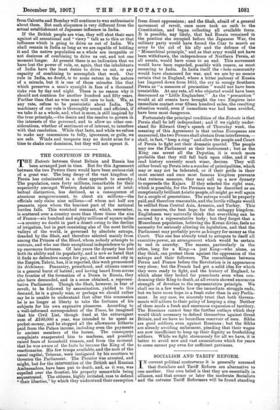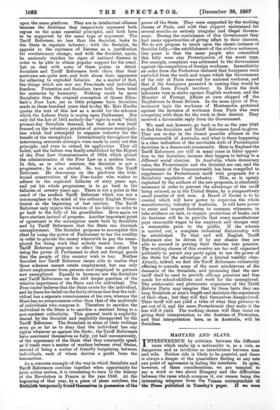SOCIALISM AND TARIFF REFORM.
IN current political controversy it is generally assumed that Socialism and Tariff Reform are alternative to one another. Our own belief is that they are essentially in alliance, and that sooner or later the moderate Socialists and the extreme Tariff Reformers will be found ,standing upon the same platform. They are in intellectual alliance because the doctrines they respectively represent both repose on the same essential principles, and both have to be supported by the same type of argument. The Tariff Reformer, no less than the Socialist, looks to the State to regulate industry ; with the Socialist, he appeals to the existence of distress as a justification for revolutionary change ; and with the Socialist, again, he anxiously watches for signs of national distress in order to be able to obtain popular support for his creed. Let us deal with some of these points in detail. Socialists and Tariff Reformers both claim that their nostrums are quite new, and both abuse their opponents for adhering to exploded fallacies. As a matter of fact, the things which are new are Free-trade and individual freedom. Protection and Socialism have both been tried for centuries by humanity. Nothing could be more Socialistic than the original conception of Queen Eliza- beth's Poor Law, yet so little progress have Socialists made in three hundred years that to-day Mr. Keir Hardie quotes the text of this law as a model for the schemes which the Labour Party is urging upon Parliament. Not only did the Act of 1601 embody the " right to work " which present-day Socialists demand, but that Act was itself framed on the voluntary practice of numerous municipali- ties which had attempted to organise industry for the benefit of the unemployed. Intermittently throughout the intervening centuries attempts were made to carry out this principle, and even to extend its application. They all failed, and the failure was finally established by the Report of the Poor Law Commissioners of 1834, which placed the administration of the Poor Law on a modern basis. In this, as in other matters, the Socialist is not a progressive ; he is an atavist. So, too, with the Tariff Reformer. He denounces on the platform the hide- bound conservatism of the Free-trader who wishes to adhere to the exploded fallacies of sixty years ago, and yet his whole programme is to go back to the fallacies of seventy years ago. There is not a point in the creed of the modern Tariff Reformer which was not a commonplace in the mind of the ordinary English Protec- tionist at the beginning of last century. The Tariff Reformer only rejects the wisdom of his father in order to go back to the folly of his grandfather. Here again we have atavism instead of progress. Another important point of agreement is the assumption made both by Socialists and by Tariff Reformers that the State can diminish unemployment. The Socialist proposes to accomplish this ideal by using the power of Parliament to tax the wealthy in order to provide the money wherewith to pay the unem- ployed for doing work that nobody wants done. The Tariff Reformer proposes to effect the same object by using the power of Parliament to shut out foreign goods that the people of this country wish to buy. Neither Socialist nor Tariff Reformer seems able to realise that these schemes cannot create employment, but can only divert employment from persons now employed to persons now unemployed. Equally in harmony are the Socialists and Tariff Reformers on the still deeper question of the relative importance of the State and the individual. The Free-trader believes that the State exists for the individual, and he bases his belief on the fairly obvious fact that the indi- vidual has a separate consciousness of his own, whereas the State has no consciousness other than that of the multitude of individuals who compose it. Therefore to sacrifice the individual to the State is to sacrifice a sentient being to a non-sentient collectivity. This general truth is explicitly denied by the Socialist and implicitly disregarded by the Tariff Reformer. The Socialists in some of their writings even go so far as to deny that the individual has any rights whatever as against the State; the Tariff Reformers have convinced themselves so fully, yet half unconsciously, of the supremacy of the State that they constantly speak as if trade were a matter of warfare between rival States, instead of being a matter of friendly bargaining between individuals, each of whom derives a profit from the transaction.
As a concrete example of the way in which Socialists and Tariff Reformers combine together when opportunity for joint action arrives, it is interesting to turn to the history of the Revolution in France in the year 1848. At the beginning of that year, by a piece of sheer accident, the Socialists temporarily found themselves in possession of the power of the State. They were supported by the working classes of Paris, and with that support maintained for several months an entirely irregular and illegal Govern- ment. During the continuance of this Government they had many opportunities of giving effect to their theories.. We do not propose to touch upon the classic instance of Socialist folly,—the establishment of the ateliers nationaux. Our point is that the same people who committed this folly were also Protectionists of the worst type. For example, complaint was addressed to the Government against the competition of foreign workmen. Immediately an order from the Prefecture declared that foreigners were excluded from the work and wages which the Government of the city of Paris reserved for national workmen, and that if the foreigners persisted in coming they would be expelled from French territory. In Havre the dock labourers rose in strike against English workmen, and the Minister of Foreign Affairs at once shipped off the Englishmen to Great Britain. In the same spirit of Pro- tectionist logic the workmen of Montmartre protested against the invasion of workmen from Paris who were competing with them for the work in their district. They received a favourable reply from the Government.
We need not, however, go back as far as the year 1848 to find the Socialists and Tariff Reformers hand-in-glove. They are to-day in the closest possible alliance in the Commonwealth of Australia, and what is there happening is a clear indication of the inevitable drift of Protectionist doctrines in a democratic community. Here in England the Tariff Reformers are still in many cases in bitter opposi- tion to the Socialists, because they happen to belong to a different social stratum. In Australia, where democracy rules, the Protectionist and the Socialist are one, and the Government of the Commonwealth has been compelled to supplement its Protectionist tariff with proposals for a Socialistic regulation of industry. This, as is openly explained by the authors of the new proposals, is absolutely necessary in order to prevent the advantage of the tariff being secured, as in the United States, by a comparatively small number of rich men. A Board of Excise is to be created which will have power to supervise the whole manufacturing industry of Australia. It will have power to enter and inspect factories, to summon witnesses, to take evidence on oath, to require production of books, and its business will be to provide that every manufacturer pays reasonable wages to his employes and charges only a reasonable price to the public. If the scheme is carried out, a complete industrial dictatorship will be established. To that end will English Tariff Reformers also be driven if by any chance they are able to succeed in putting their theories into practice. The working classes of this country are too well organised politically to permit any party again to use the power of the State for the advantage of a limited wealthy class. Already, indeed, we find the Tariff Reformers voluntarily offering to concede some of the most mischievous of the demands of the Socialists, and promising that the new tariff shall be used to provide old-age pensions and free meals for school-children and work for the unemployed. The aristocratic and plutocratic organisers of the Tariff Reform Party may imagine that by these baits they can keep Socialism at arm's length and maintain the supremacy of their class ; but they will find themselves disappointed. Their tariff will not yield a tithe of what they promise to get out of it, and the more Protectionist they make it the less will it yield. The working classes will then insist on giving their interpretation to the doctrine of Protection, and that interpretation here, as in Australia, will be Socialism.



































 Previous page
Previous page